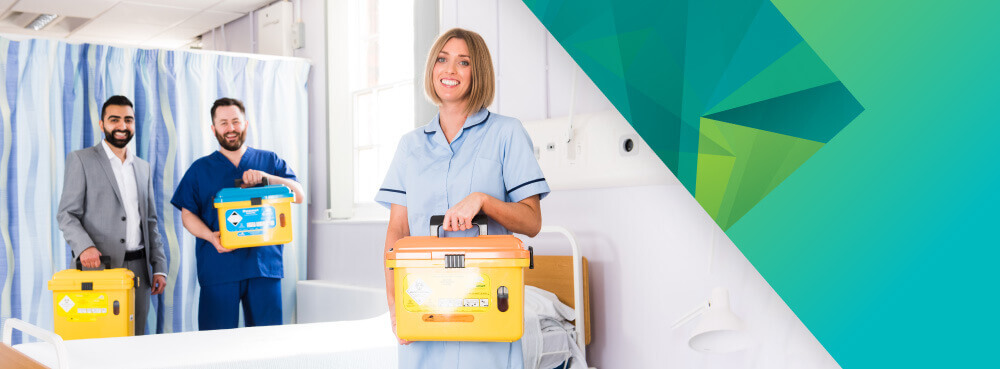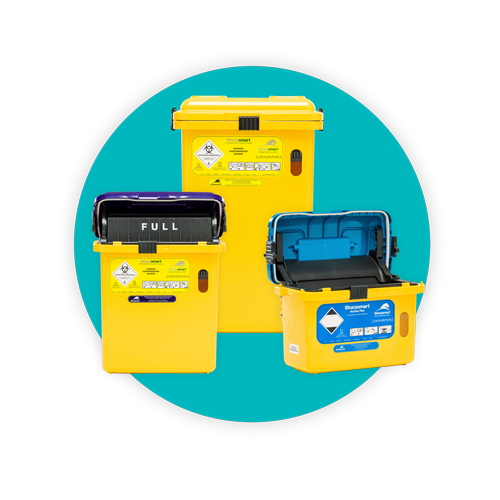Clinical Waste Considerations for GPs

General practices generate numerous types of clinical waste that needs to be properly categorised and separated. Proper clinical waste management is critical for compliant disposal. Among the most common types of clinical waste produced in a GP includes:
- Syringes or other sharps
- Dressings and/or swabs
- Pharmaceutical products
- Bodily excretions
- Blood or bodily fluids
- Human or animal tissues
Key requirements for general practices can be found in HTM 07–01 (Safe Management of Healthcare Waste), produced by the Department of Health. This document states that general practices have a ‘statutory duty of care’ that is applicable to everyone within the waste management chain for that facility.
Maintaining compliance
Adequate clinical waste management methods for any general practice that institute processes to maintain compliance must always be considered.
Numerous medical waste considerations are applicable in general practices. Proper procedures reduce the risk of exposure to blood-borne pathogens, infectious and hazardous substances, as well as sharps injury reduction for staff, patients, and visitors.
In addition to safety benefits, compliant disposal of clinical waste and adequate healthcare waste segregation reduces costs, prevents fines and penalties for non-compliance, and increases sustainability.
Maintaining compliance at any GP facility is accomplished through a continuum of processes:
- Waste policies
- Auditing
- Training
- Documentation control
- Incident management
Waste policies are essential in defining the responsibilities, goals, and details of protocol and procedures within the facility that helps to ensure safe management of clinical healthcare waste.
Waste audits are essential in training as well as recognising different waste stream. 
Regularly scheduled and structured compliance checks ensure that processes are being observed. Such audits are an excellent process for determining the types and amount of chemical waste produced at any size healthcare facility.
Pre-acceptance waste audits are required by any clinical waste producer prior to their initial delivery of waste to permitted facilities. Such audits should occur every 12 months for a medical practice that produces 5 tonnes or more of clinical waste during any calendar year (HTM 07–01).
For the most effective management of clinical and other healthcare waste, everyone involved in the facility that generates waste should have access and training regarding different waste streams and volumes that ensures staff complies with requirements.
Clinical waste is divided into four basic categories: infectious, redundant medical waste, sharps, and anatomical. Each must be segregated from the other and placed in separate containers.
Comprehensive documentation in regard to waste transfer and management and other record-keeping requirements and responsibilities also ensure that segregation processes, container type and usage, and placement and storage considerations are within regulatory guidelines. Each step in this process contributes to maintenance of compliance.
Training is also essential for all staff - from housekeeping level to management when it comes to identification of clinical waste. Proper identification of different waste streams ensures that it’s properly handled, contained, and disposed of. Clinical waste should never be mixed with general trash, either in receptacles or communal waist bins.
Does your staff know the difference between regulated and non-regulated clinical waste? What about safety standards in handling, segregation, containment, and disposal? Clear instructions and procedures for dealing with incidents including spillage or accidents not only include clinical responses, but internal as well as external documentation when required by statutes. This is especially true in the case of sharps injuries.
Proper usage of compliant sharps containers reduce needlesticks, potential exposure to communicable diseases, and saves money when it comes to healthcare cost in the treatment of such injuries.
“Cradle-to-Grave” Approach
Taking a “cradle-to-grave” approach when it comes to waste management not only minimises waste transferred out of a facility, but ensures proper segregation, use of appropriate colour-coded waste bins and their storage.
The duty of care for GPs emphasizes the cradle-to-grave approach. GPs are also responsible for ensuring that staff are trained and knowledgeable regarding waste procedures.
The cradle-to-grave approach also underscores that full compliance regarding waste management is the legal responsibility of the GP and not the waste contractor.
In a general practice, waste segregation must meet legal requirements for:
- Cytotoxic and cytostatic waste
- Medicinally and non-medicinally contaminated sharps
- Other medicines
- Yellow and orange bag clinical waste
- Offensive waste (yellow/black bags)
- Waste chemicals
- Human tissues
- Gypsum (used in the production of plaster casts in dentistry, podiatry, and fracture clinics)
- Other wastes
Such guidelines and considerations for general practices not only minimise waste heading to landfills, but saves money on medical waste disposal. These guidelines focus on compliance with regulations. Of course, volume and type of medical waste generated at your facility has an influence on such issues, as will local and governmental guidelines and regulations.
Conclusion
Sharpsmart provides clinical waste solutions for GPs and other medical facilities. Our efforts to date have decreased greenhouse gases by 3,000 tonnes and diverted over 500,000 kg of plastic from landfills. We specialise in point-of-use disposal solutions that reduce the risk of infection transfers and minimisation of waste through use of accessible and reusable containers designed for safety, environmental efficiency, and cost savings. For more information on how we can help you remain compliant, contact us today.
